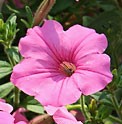 Petunias are tender perennials native to South America but grown as annuals. They belong to the tomato family (Solonacea) that also includes tobacco, peppers, and eggplant. There are about twelve species but P. grandiflora, P.floribunda, and P. multiflora and their offspring are the most commonly offered for sale either as seeds or seedlings. Many of the petunias that you buy in nurseries are hybrids of these three species and although plants often self sow ultimately the offspring will revert to the wild, white-flowered kind. Double flowered varieties do not set seed so the seed must be purchased each year. All petunias can be grown from purchased seed with reliable predictable results but don’t count on collecting seeds from you plant to replenish your crop of petunias.Petunias have tiny seeds and are slow growing so can be difficult for the beginner. Seed are best sown indoors 10-12 weeks before transplanting outdoors. In warm climates, seed can be direct-sown after the last spring frost.
Petunias are tender perennials native to South America but grown as annuals. They belong to the tomato family (Solonacea) that also includes tobacco, peppers, and eggplant. There are about twelve species but P. grandiflora, P.floribunda, and P. multiflora and their offspring are the most commonly offered for sale either as seeds or seedlings. Many of the petunias that you buy in nurseries are hybrids of these three species and although plants often self sow ultimately the offspring will revert to the wild, white-flowered kind. Double flowered varieties do not set seed so the seed must be purchased each year. All petunias can be grown from purchased seed with reliable predictable results but don’t count on collecting seeds from you plant to replenish your crop of petunias.Petunias have tiny seeds and are slow growing so can be difficult for the beginner. Seed are best sown indoors 10-12 weeks before transplanting outdoors. In warm climates, seed can be direct-sown after the last spring frost.
Directions:
1. If you smoke, always wash hand thoroughly with soap and warm water before handling petunia seeds or seedlings to prevent the spread of tobacco mosaic virus.
2. Mix seed with fine, dry sand to make sowing easier.
3. Sow seeds thinly on the surface of the soil and do not cover as the seeds need light to germinate.
4. If starting in flats water by placing the flat in a tray and adding water to the tray only. This helps to avoid damping off a common problem of petunia seedlings.
5. For best germination provide a soil temperature of 70-80 F. Germination should occur in five to twenty one days depending on the variety and conditions.
6. When seedlings develop three to four sets of leaves transplant to individual containers.
7. Transplant outdoors when all chance of frost is past and the soil is warm spacing eight to twelve inches apart.